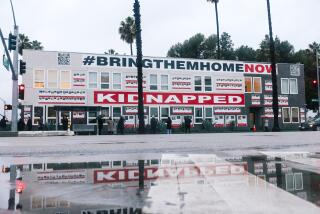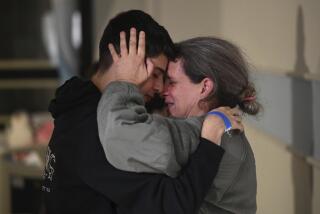Second Beheading Reported
BAGHDAD — Militants said Tuesday that they had beheaded a second American hostage in as many days and threatened to kill a British captive, increasing pressure on President Bush and British Prime Minister Tony Blair to confront a recent wave of kidnappings of foreigners in the Iraqi capital.
The kidnappers had demanded the release of all female Iraqis being held by the United States, and a Justice Ministry spokesman said this morning that the Iraqi government had decided to release one of the two women known to be held.
The spokesman, Noori Abdul Raheem, denied that the decision to grant bail to Rahib Rasheed Taha -- nicknamed “Dr. Germ” for her biological weapons research -- had anything to do with the kidnappers’ demands. He gave no alternative explanation for the decision but said her case had been under review for some time.
“You know that the Iraqi transitional government has asserted many times that it does not negotiate with terrorists,” Raheem said.
The Iraqi government claims legal custody over all Iraqi prisoners, including deposed dictator Saddam Hussein. But Taha -- like Hussein and his top lieutenants -- is in physical custody of the U.S. military. It was not immediately known whether the U.S. would agree to the release, or whether her freedom would save British hostage Kenneth Bigley.
The kidnapping group, Jamaat al Tawhid wal Jihad, announced on a website Tuesday that it had killed Jack Hensley, a Marietta, Ga., man who would have turned 49 today. The announcement came almost 24 hours after a grisly video on the Internet depicted the beheading of Eugene “Jack” Armstrong, a Michigan native who was among three construction contractors abducted Thursday from their Baghdad home.
On Tuesday, the FBI confirmed that Armstrong’s body had been recovered, but declined to provide details.
The confirmation came as world leaders gathered in New York for the opening of the U.N. General Assembly. Bush and interim Iraqi Prime Minister Iyad Allawi proclaimed that they were prevailing in the war against insurgents and warned that “terrorist attacks” might escalate.
After his U.N. address, Bush acknowledged Armstrong’s death and was joined by Allawi in denouncing the group that killed him. Their remarks came before U.S. officials learned that Hensley apparently had been killed.
Last week, Armstrong, Hensley and Bigley appeared in a video, blindfolded and surrounded by armed men.
The statement Tuesday from Jamaat al Tawhid wal Jihad, which is led by Jordanian militant Abu Musab Zarqawi, promised that a video of the Hensley killing would be posted soon. It said Bush would “die in his fury” and Blair would “weep blood.”
The statement, which could not be independently verified, said Bigley would “suffer the same fate” if the captors’ demands were not met.
In London, Bigley’s son pleaded for Blair to meet the demands.
“I ask Tony Blair personally to consider the amount of bloodshed already suffered,” Craig Bigley said in a videotaped statement. “Please meet the demands and release my father.... Only you can save him now.”
Blair called the family Tuesday afternoon.
“I truly believe I’ve lost Ken,” Bigley’s brother Paul told Channel 4 Television News on Tuesday night.
The kidnapping of foreigners has fueled a debate in Iraq about who was an appropriate target. In a Tuesday interview on the Qatar-based Al Jazeera satellite news channel, a prominent Sunni Muslim cleric sought to draw a distinction between the three contractors and two Italian aid workers and two French journalists currently held hostage.
“The French and Italians are innocent,” said Sheik Abdel Sattar Abdel Jabbar, a member of the Muslim Scholars Assn., a group of Sunni clerics who oppose the U.S.-led military intervention and the U.S.-appointed interim government. The group sometimes acts as a go-between in negotiations for the release of foreign hostages. It has also been accused of playing a direct role in the recent wave of kidnappings targeting foreigners.
Abdel Jabbar said that Armstrong, Hensley, Bigley and other contractors were in a different category because they served the U.S. military. The three men, employees of Gulf Services Co., based in the United Arab Emirates, were helping to build and service a large U.S. base in the town of Taji, just north of the capital.
Abdel Jabbar objected to international sympathy for the three men “who help build bases used to wage war on the Iraqi people.”
He said, “The deaths of thousands of innocent Iraqis who want peace and freedom doesn’t concern anybody.”
Elsewhere in Iraq, a car bomb attack on a U.S. convoy killed at least three people and injured more than 15, including four American soldiers. The bomber struck about 3:30 p.m. along a road leading to Baghdad’s international airport. The explosion destroyed several vehicles.
Also Tuesday, the U.S. military announced the death of four military personnel during the last three days. Two members of the 1st Cavalry Division died Saturday when their vehicle was hit by a roadside bomb.
In Anbar province, which includes the guerrilla strongholds of Fallouja and Ramadi, two Marines were killed in separate incidents, the military said. At least 60 U.S. troops have been killed this month.
*
Times staff writer Thomas S. Mulligan in Baghdad and special correspondents Raheem Salman and Salar Jaff in Baghdad contributed to this report. Times wire services were used in compiling it.
More to Read
Sign up for Essential California
The most important California stories and recommendations in your inbox every morning.
You may occasionally receive promotional content from the Los Angeles Times.










